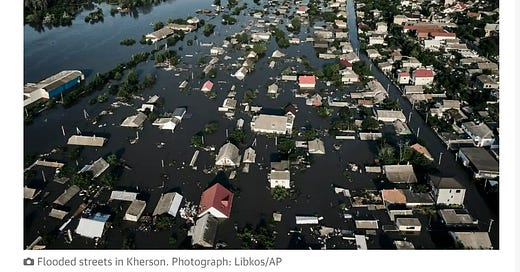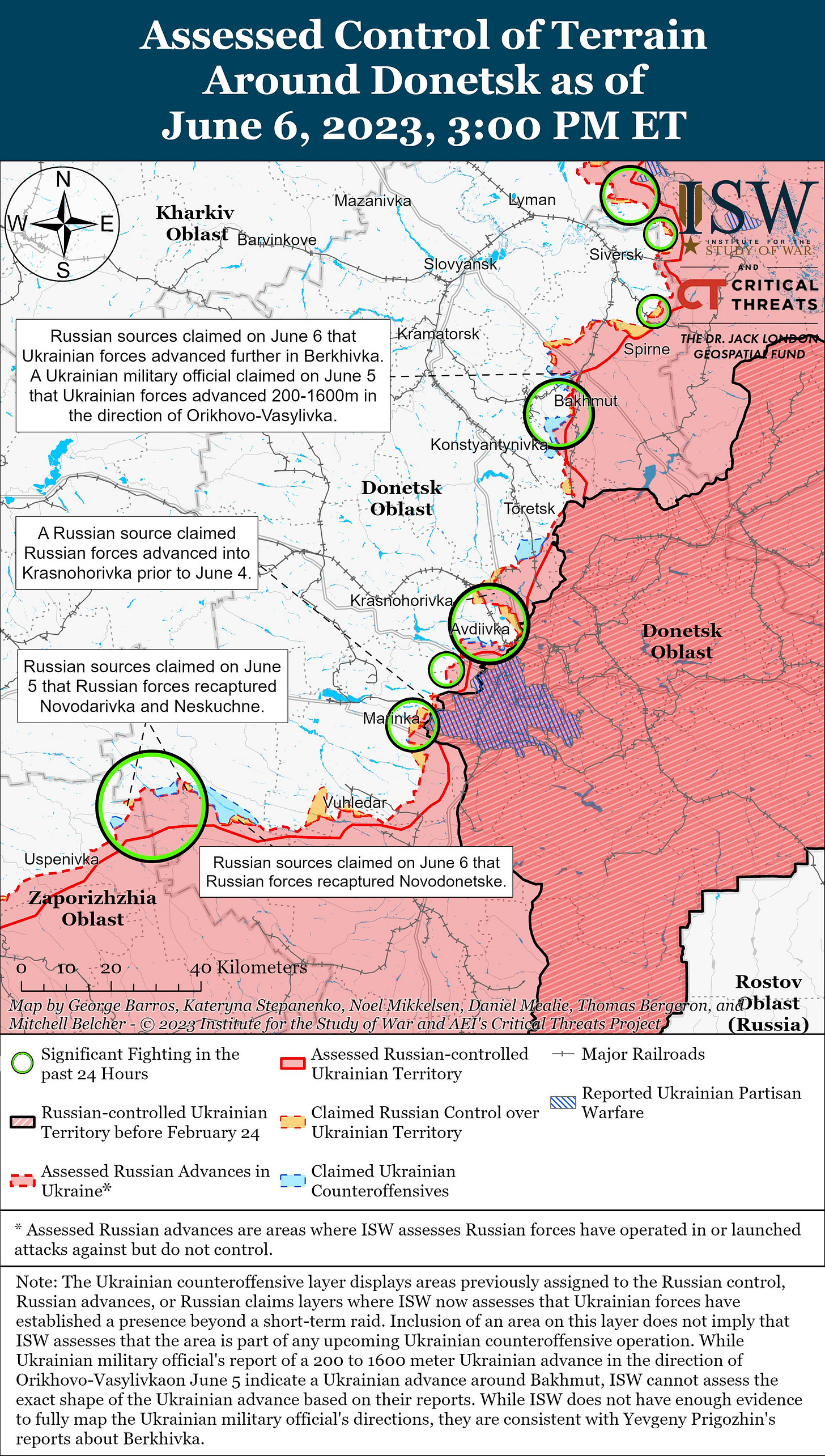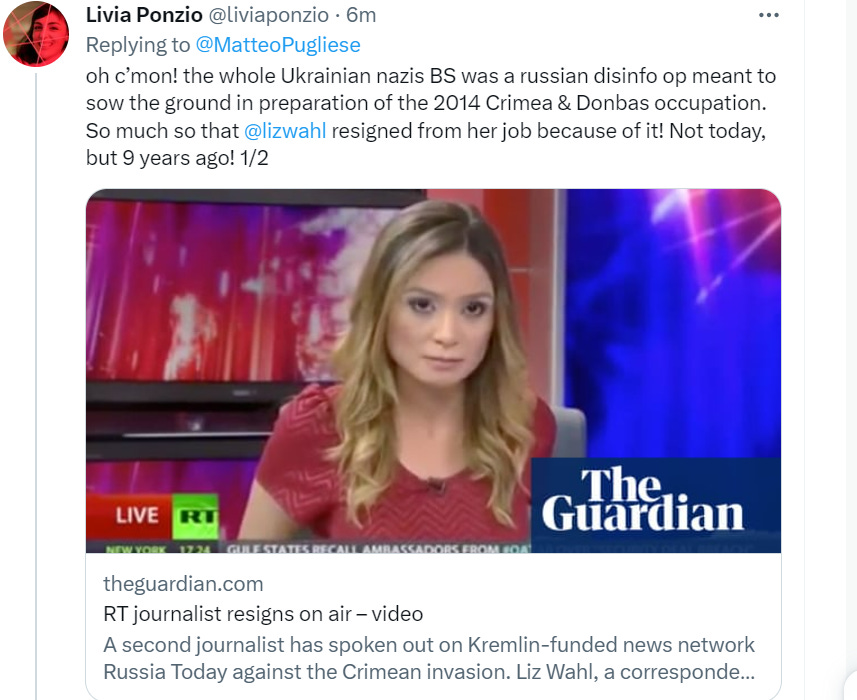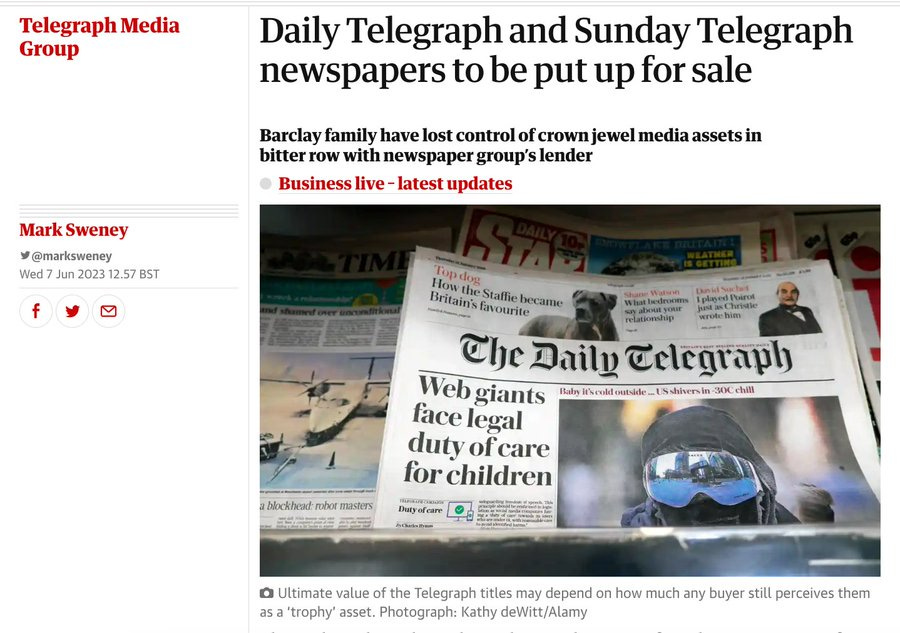Jun 8: E-Stories
Day 469: Kakhova Donetsk Mar'ynka Belgorod Kherson BlackSea Crimea passport SA EUpolling sanctions Erdogan Pence Trump A&P TheGuardian ISW UKDef Zelensky Betsa Switzerland Pichler Ponzio Kenyon Saldo
Catching up…
EA Worldview’s Ukraine Up-date- hop over to Scott’s amazing hourly Ukraine up-date page. I’ll fill in with some bits and bobs.
Interior Minister: 29 settlements in Kherson Oblast flooded. Due to Russia's destruction of the Kakhovka dam, 29 settlements in Kherson Oblast have been flooded, Interior Minister Ihor Klymenko announced on June 7. Over 1,800 people have been evacuated thus far.
Governor: Floods hit Mykolaiv Oblast, 13 settlements under threat. The floods caused by the Kakhovka dam destruction have reached Mykolaiv Oblast with at least 13 settlements under threat, Governor Vitalii Kim said on June 7.
Stories we’re following…
At night Russia attacked Ukraine with 35 cruise missiles. The Ukrainian air defense shot down all of them. Most of them headed for the Ukrainian capital. Overall, Russia attacked 10 Oblasts of Ukraine over the past day.
Ukrainian Defense Forces conducted a number of successful attacks north and south-west of Bakhmut, in the western part of Donetsk Oblast and eastern Zaporizhzhia Oblast. They have intensified their activities in selected areas, simultaneously misleading the enemy regarding the true direction of the main strike and the overall concept of the counteroffensive in general.
In the Maryinka direction, the Ukrainian Defense Forces repelled numerous Russian attacks in the area of Maryinka. The Russian military lost about 70 killed, more than 100 wounded and 17 pieces of military equipment.
The Russian Volunteer Corps [fighting on Ukraine’s side], with the support of the Polish Volunteer Corps, continues to operate in border villages in the Belgorod region of the Russian Federation.
Russian forces attack Kherson as rescue workers evacuate civilians. Two Kherson police officers were injured by Russian artillery fire while trying to evacuate civilians from flooding caused by Russia's destruction of the Kakhovka Hydroelectric Power Plant, the Interior Ministry reported on June 6.
The Russian Black Sea Fleet command is trying to avoid the loss of materiel by transferring it to the mainland of the Russian Federation in the Novorossiysk region due to widespread problems with logistics and ammunition in occupied Crimea.
The cities of Yevpatoria and Kerch in occupied Crimea started experiencing water shortages due to Russia blowing up the Kakhovka dam. According to Mykhailo Podolyak, an adviser to the head of the Office of the President of Ukraine, there is panic in the occupied Crimea after the explosion.
The Federation Council at a meeting on Wednesday, June 7, approved amendments to the law "On the procedure for exit and entry", expanding the powers of border guards in working with citizens' passports. According to the document, which was prepared by the government and adopted by the Duma in one day in all readings, FSB border control officers will be able to confiscate passports from Russians who are not allowed to travel abroad.
Russian defence minister Sergei Shoigu has ordered military contractor Almaz-Antey to speed up the time it takes to launch new production facilities to manufacture air defence systems, his ministry said on Wednesday.
Putin held a phone call with his South African counterpart Cyril Ramaphosa, the Kremlin said on Wednesday. The two leaders discussed “issues related to the well-known African initiative to find a solution to the Ukrainian conflict”, it added.
Nikolai Patrushev, secretary of the Russian security council, has said that the US is waging an undeclared war on Russia and Belarus, and is seeking to replace the government in Belarus.
The US is waging an undeclared war against Russia and Belarus in order to destroy the national identity and peoples of our countries. Today, western politicians speak openly about this and indicate in their documents.
[The US] does not need a strong Russia, they want to either dismember it or liquidate it in order to manage the Eurasian territory, extracting resources.
This is the implementation of a colour revolution and the bringing to power of a controlled puppet government. The West failed to carry out a coup d’état in Minsk in 2020, but Washington and its satellites did not abandon their plans.
Maria Zakharova, official spokesperson of the Russian foreign ministry, has said on Sputnik Radio that the government in Kyiv could not survive for “a hundredth of a second” without the support of the west, and claimed as a consequence that Ukraine was blackmailing the world.
Monique: The Russians are advancing two narratives in their information operations at this moment. The first is that the West needs to stop arming Ukraine—this is the path to peace. Hence the uptick in so-called peace marches in Europe and overseas. More importantly, they are denigrating Ukraine, as seen in the Zakharova statement, in view of the up-coming NATO Summit in Vilnius in mid-July. Part of this effort can be seen in the increase of posts and articles focusing on Ukraine being falsely branded as a nazi state.
President Zelensky: “The whole world knows about this Russian war crime, the crime of ecocide – the deliberate destruction of the dam and other structures of the Kakhovka hydroelectric power plant by the Russian occupiers. In fact, Russian terrorists have detonated an environmental bomb of mass destruction.”
For the sake of their own security, the world should now show that Russia will not get away with such terror. And I am grateful to all leaders and states, all nations and international organizations that have supported Ukraine and are ready to help our people and our de-occupation efforts. Life must prevail, Ukraine must win! Thank you to everyone who supports Ukraine.
Scott Lucas on France24 explains who might benefit from the Nova Kakhovka dam destruction: "The most likely cause at this point of the collapse are explosives that were placed on the dam and there's only one party that's in a position to do that".
Russian proxy in Crimea claims no water shortages on peninsula. Moscow-installed head of occupied Crimea, Sergey Aksyonov, claimed on June 6 that the peninsula's water reservoirs were "about 80% full" following Russia's destruction of the Kakhovka hydroelectric plant supplying Crimea with water.
Everything is fine: the Kremlin-installed “governor”, Vladimir Saldo, dressed in camouflage and helmet and sitting in front of the flooded remains of the town centre of Nova Kakhovka, claimed that the city was “alive”. [Monique: you can’t make this up.]
“People are calmly walking around the streets,” said Saldo, as the flood waters rose up the walls of the city hall behind him. “I’ve just driven around the streets, people are working, the gas stations are open, some stores are open.”
“In military terms, the situation has worked out in a way that is operationally and tactically in favour of Russian forces,” Saldo told pro-Kremlin TV presenter Vladimir Solovyov.
According to locals, the Russian authorities have set up checkpoints. They refuse to let volunteers enter the town to help with evacuation. Local Telegram channels are full of desperate messages from relatives, asking for their loved ones to be rescued.
One message read:
SOS!!! Can anyone with a boat help? Cottagers Anna .. and her husband have been sitting on their roof since morning, praying for rescue. They’ve raised a white flag. It’s the first house on the right. Help!!!”
Ukraine to build new station instead of destroyed Kakhovka hydroelectric plant. Ukraine will build a new power plant on the site of the destroyed Kakhovka Hydroelectric Power Plant located on the Russian-occupied east bank of the Dnipro River once it liberates the territory, head of Ukraine's state-owned energy company Ukrhydroenergo Ihor Syrota said on June 6.
Ukraine’s UN envoy urges UN, international organizations to help after Kakhovka dam breach. Permanent Representative of Ukraine to the United Nations Sergiy Kyslytsya urged the international community to condemn the Russian destruction of the Kakhovka dam at the June 6 UN Security Council meeting.
Recep Tayyip Erdoğan, President of Türkiye, held a telephone conversation with Ukrainian President Zelensky on Wednesday, 7 June, reports European Pravda. Erdoğan offered Zelensky to set up a commission involving "experts from the warring parties, the UN, and the international community including Türkiye" to conduct a "detailed investigation" into the explosion at the Kakhovka dam.
Bulgaria's new defense minister vows to support Ukraine with military aid. Todor Tagarev, Bulgaria's newly-appointed defense minister, said on June 6 that his country must do what is necessary to provide Ukraine with assistance so that it can liberate its territories from Russian occupation.
Prosecutors: 63 journalists from 14 countries killed by Russia's war since Feb 24, 2022. The Prosecutor General's Office reported on June 6 that 63 journalists from 14 countries, including Ukraine, have been killed by Russia's war since the start of the full-scale invasion.
Politico: EU countries are nearing a deal on the 11th sanctions package against Russia. Their permanent representatives in Brussels are aiming to get the package over the line at their meeting today — but with several questions still open, it’s still unclear whether they’ll get there, five EU diplomats said. The 11th sanctions package focuses on anti-circumvention of the existing sanctions and includes a new mechanism to potentially punish countries outside of the EU that enable sanction evasion.
Go to the website to check companies in your country.
The Kremlin's attempts to seize on the elusive zone of influence in Central Asia continue to run into resistance from the leadership of the post-Soviet republics. Following Kazakhstan, which ridiculed the proposal to join the union state of Russia and Belarus, Tajikistan refused to expand the format of cooperation with Moscow. Dushanbe is not considering the possibility of joining the Eurasian Economic Union (EAEU).
The Day After Summit: Russian critics of Vladimir Putin urged the EU to step up sanctions against government officials involved in domestic repression, reports Politico. Speaking to a packed room in the EU Parliament, Russian diaspora figures called on lawmakers to close sanctions loopholes and set up an ad hoc body modeled on the U.S. Office of Foreign Assets Control. Senior EU officials including Commission VP for Values and Transparency Věra Jourová discussed with the Russia experts how the country can reach democracy and its possible future after Vladimir Putin.
President Ursula von der Leyen is set to announce the EU’s economic security strategy on June 20 — just in time for EU heads of government and state to discuss the doctrine at their summit on June 29-30. It follows last month’s G7 meeting where “de-risking” from China was a major theme. Beyond screening foreign takeovers of EU companies, and imposing penalties on subsidized competitors, the Commission is planning to propose an “outbound investment screening mechanism” — along the lines of similar proposals from Washington.
Former Vice President Mike Pence announced he’s running for president on Wednesday, setting up a battle for the Republican nomination with his former boss, Donald Trump. In a launch video released ahead of his campaign kickoff later in the day in Iowa, Pence casts himself as a Reagan Republican seeking to return America to conservative principles.
NYT: The latest twist in the inquiry into former President Trump’s handling of classified documents is the surprise revelation that a federal grand jury in Florida has recently started hearing testimony in the case.
What does the Geneva Convention say about destroying dams?
Article 56 of the Protocol Additional to the Geneva Conventions of August 12, 1949, explicitly prohibits targeting dams.
"Works or installations containing dangerous forces, namely dams, dykes, and nuclear electrical generating stations, shall not be made the object of attack, even where these objects are military objectives, if such attack may cause the release of dangerous forces and consequent severe losses among the civilian population."
Dietmar Pichler: a note on terms
Kherson has no "Russian part"; it is Ukrainian territory. There are parts that are occupied by Russian forces. Moreover, there is no "mayor" and no "authorities," only an illegal Russian puppet administration set up by the Kremlin.
There is also no "Moscow-backed local government" or anything of the sort, implying a separatist uprising prior to the full-scale invasion, which never existed. This wording was already incorrect in 2014 and remains even more incorrect now.
The people who illegally seized control of Ukrainian territories are Russian military forces, and the criminals of the Russian occupation regime, which was fully initiated by the Kremlin. The presence of certain collaborators does not alter this fact.
The normalization of the presence of these forces that illegally seized control of parts of Ukraine implies the normalization of torture, deportation, rape, and re-education.
The European Resilience Initiative Center interviewed Tamila Tasheva, a permanent representative of the President of Ukraine in Crimea, who currently based in Kyiv. In this interview, Ms. Tasheva speaks about Ukraine's fight for the liberation of Crimea, and explains: When Crimea will be liberated, how Russia militarized Crimea, Crimea's resistance against the Russian occupation, Russia's ecocide in Crimea and its consequences.
Jon Henley, Europeans who see Russia as adversary or rival double in number since 2021
Fifteen months after Russia invaded Ukraine, twice as many Europeans – almost two-thirds – view Moscow as an adversary or rival as did before the war, but opinions on the continent’s long-term relations with its eastern neighbour still vary widely.
A multi-country survey by the European Council on Foreign Relations (ECFR) also found a large majority in favour of the EU boosting its defence capabilities rather than relying on the US and many seeing China as a partner, not a competitor.
About 64% of respondents across the 11 EU member states in the survey said they saw Vladimir Putin’s Russia as a competitor (9%) or, worse, an opponent (55%) – double the number who felt the same way when the question was asked in 2021.
The proportion of people holding a strongly negative view of Russia varied widely, however, ranging from 74% in Denmark, 71% in Poland, 70% in Sweden, 67% in the Netherlands and 62% in Germany, to 37% in Italy and just 17% in Bulgaria.
About 39% of Hungarians and 65% of Bulgarians saw Russia as an ally or a necessary partner. “Worryingly, Italy falls somewhere in between,” the report’s authors wrote. “Other capitals could fear Rome revisiting its [pro-Ukraine] stance.”
A smaller proportion of Europeans – almost half (48%) – said they thought their country should have only a “limited” relationship with Russia if the war ended in a negotiated peace settlement, for example by trading only in certain industries.
Again there was a wide range of opinion, with Poland (39%) the most in favour of cutting all ties with Russia, while Germany (26%), Hungary (32%), Austria (36%) and Bulgaria (51%) showed strong support for full postwar cooperation with Russia.
“The prevailing view is that Europe should pursue a limited relationship with Russia,” the report’s authors said. “Overall, this provides the foundation for an agreement among the European public ... But some controversy looks unavoidable.”














